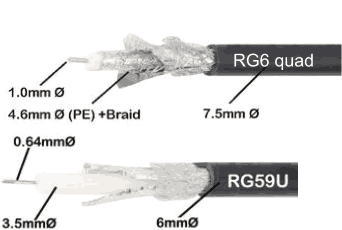We use RG6 Quad shielded Coaxial cable for free to air TV antenna and Foxtel installations and extensions. Despite common belief RG59 might be a better alternative for some antenna installations.
| RG6 | RG59 | |
|---|---|---|
| external diameter | 7.5mm | 6mm |
| shielding effectiveness | over 80dB | over 50dB |
| 100 metres signal reduction at 211Mhz | 10dB | 11dB |
| 100 metres signal reduction at 400Mhz | 13dB | 16dB |
| conductor dc resistance ohms/km | 90 | 170 |
| return loss 5-450Mhz | 20dB | 20dB |
| price, cut and terminated | $1/m | |
The performance difference between RG6 and RG59 for TV antennas is small in the Sydney Northern Beaches, where broadcast channels range from about 150 to 650 MHz.
RG6 has stronger shielding at higher frequencies including mobile network bands. RG6 also offers better UV and moisture protection for outdoor installations.
RG59 is thinner, more flexible, and easier to run indoors through tight spaces or under carpets. RG59 braid reduces low frequency interference below 50 MHz which is not reflected in the table. It is suitable for short indoor antenna leads up to about 20 metres, but not recommended for Foxtel or longer UHF runs.

RG6 and RG59 cost from 40 cents to $1 per metre depending on how much you buy.
If reception improves after replacing the TV cable but problems remain, the issue is likely with the antenna. When the antenna is working properly, the type of short cable from the wall to the TV makes little difference. If issues continue, we can realign, repair, or replace the antenna system to restore reliable TV reception.
Antenna repairs